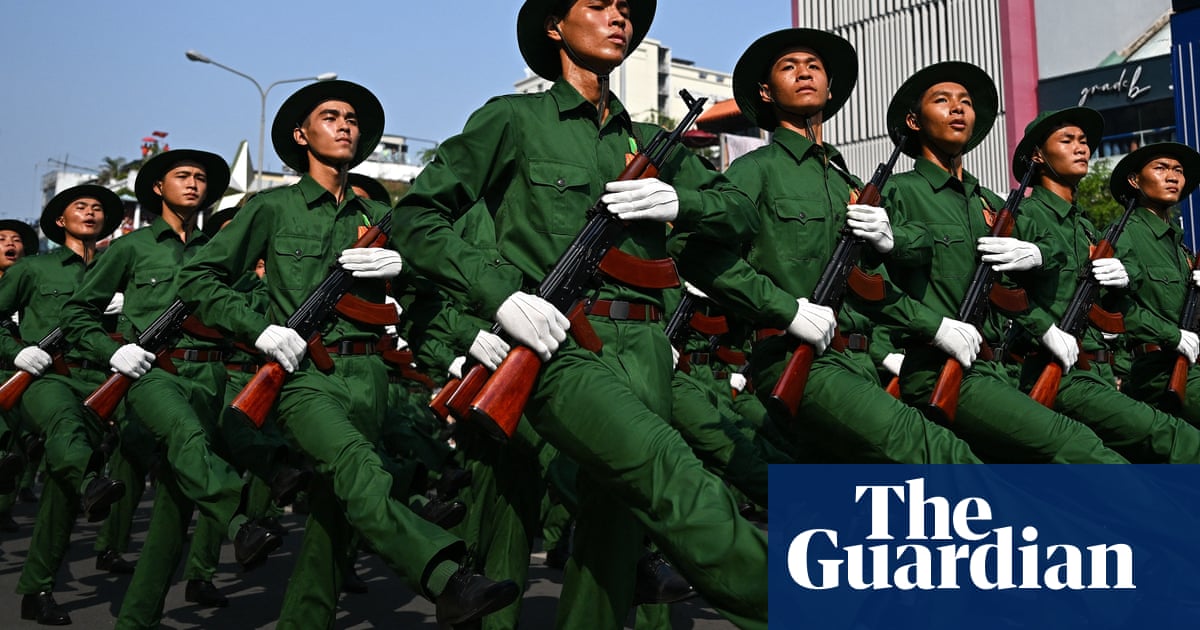Thousands of Vietnamese people have celebrated the 50th anniversary of theend of the Vietnam war, in what the country’s communist leader said was a “victory of justice over tyranny”.
Celebrations culminated in a grand parade in Ho Chi Minh City with thousands of marching troops and an airshow featuring Russian-made fighter jets and helicopters, as Vietnamese waved red flags and sang patriotic songs.
Underlining warming ties with Beijing, a contingent of 118 Chinese troops was expected to march alongside Vietnamese soldiers and policemen “to honour the international support Vietnam received during its struggle for independence,” according to state media.
The historic anniversary commemorates the first act of the country’s reunification on 30 April, 1975 when Communist-run North Vietnam seized Saigon, the capital of the US-backed South. The city was renamed Ho Chi Minh city shortly after the war, in honour of the North’s founding leader.
“It was a victory of justice over tyranny,” To Lam, Vietnam’s Communist party chief and the country’s top leader, said on Wednesday, citing one of Ho Chi Minh’s mottoes: “Vietnam is one, the Vietnamese people are one. Rivers may dry up, mountains may erode, but that truth will never change.“
The fall of Saigon, about two years after Washington withdrew its last combat troops from the country, marked the end of a 20-year conflict that killed some 3 million Vietnamese people and nearly 60,000 Americans, many of them young soldiers conscripted into the military.
“Communist troops rolled into the South Vietnamese capital virtually unopposed, to the great relief of the population which had feared a bloody last-minute battle,” said a cable from one of the Reuters reporters in the city on the day it fell.
The cable described the victorious army as made up of “formidably armed” troops in jungle green fatigues but also of barefoot teenagers.
Those events were seared into many memories by the images of US helicopters evacuating some 7,000 people, many of them Vietnamese, as North Vietnamese tanks closed in. The final flight took off from the roof of the US embassy at 7.53am on 30 April, carrying the last US Marines out of Saigon.
The formal reunification of Vietnam was completed a year later, 22 years after the country had been split in two following the end of French colonial rule.
Vietnam and the United States normalised diplomatic relations in 1995 and deepened ties in 2023 during a visit to Hanoi by former US President Joe Biden.
“The United States and Vietnam have a robust bilateral relationship that we are committed to deepening and broadening,” a spokesperson for the US Mission in Vietnam said on Wednesday.
That bond is however now being tested by the threat of crippling 46% tariffs on Vietnamese goods that Biden’s successor, Donald Trump, announced in April.
The tariffs have been largely paused until July and talks are under way. But if confirmed, they could undermine Vietnam’s export-led growth that has attracted large foreign investments.
Washington sent Susan Burns, its consul general in Ho Chi Minh city, to represent the country at the parade.
While Hanoi has re-established relations with the US, it has maintained close ties with Russia, which is its top supplier of weapons.
Vietnam has also nurtured closer relations with northern neighbour China despite a complex history involving several conflicts and a rivalry in the disputed South China Sea.
China is now a major investor in its economy and the source of many of the components that are used in products that are then exported to the US
